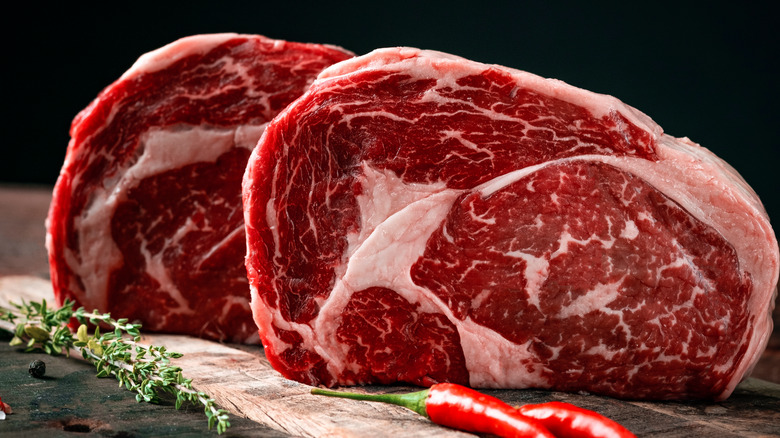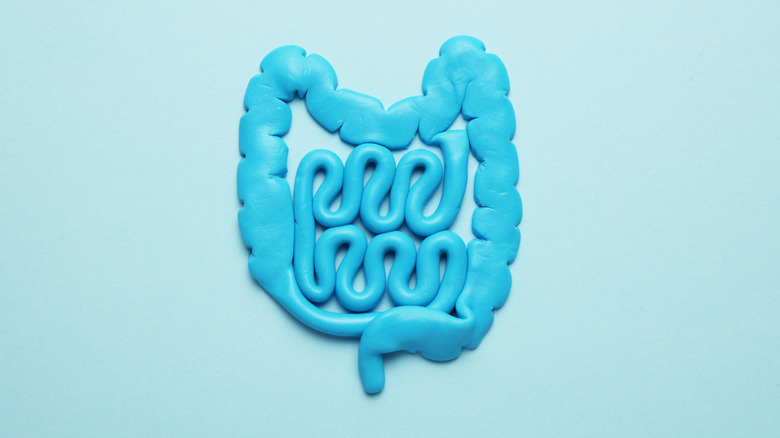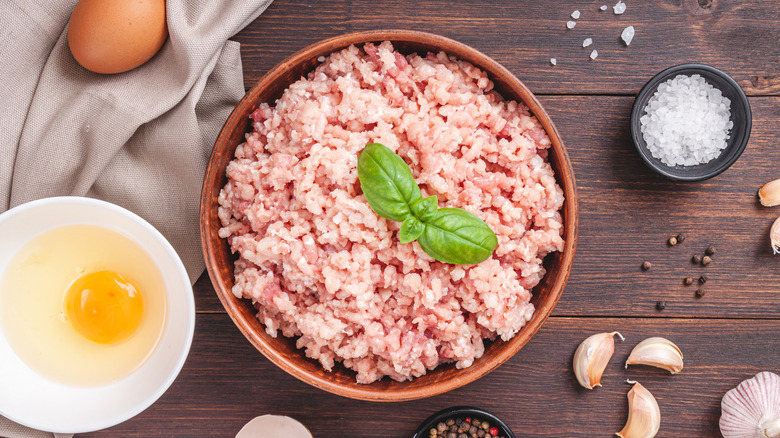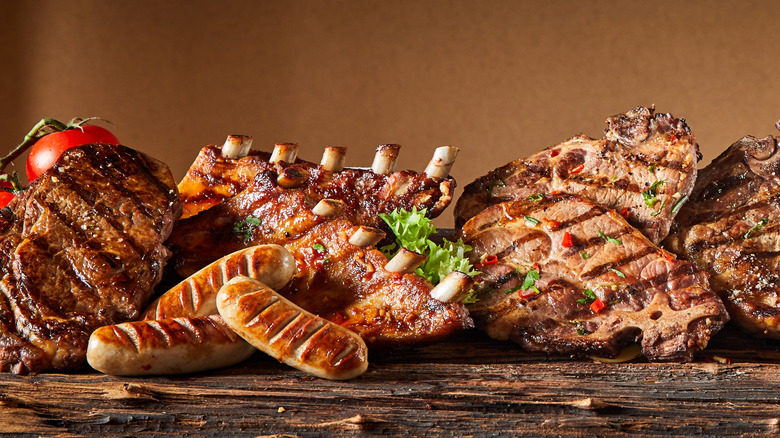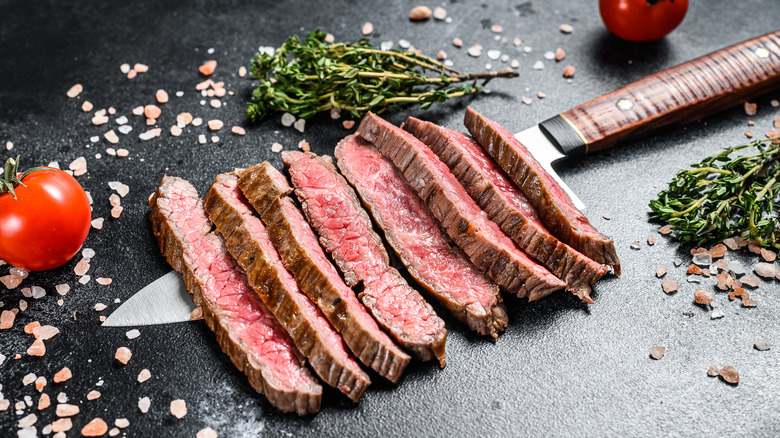When You Stop Eating Meat, This Is What Happens To Your Body
Meat is having a bit of a PR crisis right now. While it's safe to say that burgers, hot dogs, and barbecues are in no danger of disappearing overnight, more and more people are becoming aware of the downsides of eating meat regularly — thanks, in part, to increasing understanding about how our meat-eating ways could affect the environment. According to Greenpeace, the meat industry's activities are a strong contributor to deforestation, the destruction of wild animal habitats, and the release of greenhouse gases.
What's more, on a health level, our understanding of how stopping eating meat and embracing a plant-based diet is developing more than ever. "Studies have shown that people who focus on increasing their intake of plant-based foods show lower risks of heart disease, high blood pressure, diabetes and even some forms of cancer," states Penny Kris-Etherton, a fellow of the American Heart Association and distinguished professor of nutrition at Penn State College of Health and Human Development, to Bustle. But, how exactly does giving up meat cause this — and what else happens to your body if you stop eating meat, for whatever reason? Here at Health Digest, we've got the lowdown.
Your gut health could improve when you stop eating meat
It's hard to overstate how important keeping our guts in good shape is for our health. Everything we eat and drink goes through it and interacts with the bacteria that live along the way, known as our gut microbiome. This city of bacteria dictates a huge amount of our health. As A. Venketeshwer Rao, professor emeritus in the Department of Nutritional Sciences at the University of Toronto, says, "It's the predominance of the beneficial bacteria referred to as the probiotic bacteria ... that ensure good health and prevent diseases of the gut and other organs in the body," to Today's Dietitian.
Eating meat can seriously mess with these little helpers to our health. "Meat, particularly red meat and processed meats, can promote inflammation in the gut, which, in turn, alters good bacteria and can lead to digestive problems such as constipation and bloating," states Maria Pena, assistant professor of medicine, endocrinology, diabetes and bone disease at Mount Sinai's Icahn School of Medicine, to Livestrong. By contrast, giving up meat and embracing a plant-based diet can give us some serious brownie points with our guts. A review of studies published in Frontiers in Nutrition shows a vegetarian or vegan diet can effectively promote a diverse range of good bacteria in our bellies.
Your skin might be a little brighter when you stop eating meat
"Look at you! You're glowing!" said positively no one after you've just eaten a round of hamburgers. Unfortunately, meat is not our skin's best friend, and giving up meat could help our skin's health improve pretty dramatically, particularly if you experience skin outbreaks. "Although being vegetarian doesn't cut out the main acne-triggering foods, such as dairy or sugar, according to the American Heart Association, most vegetarian diets are lower in fat, saturated fat, and cholesterol," says board-certified dermatologist Dr. David Lortscher to Healthline. "Consuming fewer calories can decrease skin oil production, thus reducing outbreaks."
In fact, if you really want to help boost your skin health, it could be the case that giving up dairy is a great move. Dermatologists like Sarika Snell suggest that removing dairy from your diet could help with skin health due to the whey protein and hormones often present in dairy products like skim milk (per Insider). If you're not ready to take the plunge to give up dairy products, though, starting with meat is a solid option to help your skin.
When you stop eating meat, your body might struggle to get enough of B12
Giving up meat can bring an array of health positives, but, when it comes to vitamin B12, it's important to account for alternative sources in your diet. Vitamin B12 plays a crucial role in our cellular health, and proper levels of it help to keep our DNA, nerves, and blood cells functioning correctly, as well as providing the body with energy, says Healthline. While B12 is readily available in meat, it's harder to come by once you remove it from your diet and, if you're not careful, you could end up with a B12 deficiency, which can lead to complications like anemia.
The good news, however, is that B12 is also present in animal products like eggs and dairy so, if you're only giving up meat and not going full-on vegan, you can still access food sources. If you are adopting a vegan diet, dietary sources of B12 like nutritional yeast and fortified cereals can help keep your levels up, or a daily dietary supplement could be a good choice. Whatever choice you make, it's important to remember to account for the levels lost when you give up meat.
Your heart health will likely improve when you give up meat
Gosh, our hearts work hard, don't they? It's little wonder that keeping them healthy is one of the most important things we can do — out of respect for their hard work, really, if not their vital function for our health. So, it's great news for your ticker if you're giving up meat, as doing so can provide health benefits for your heart, says Mayo Clinic. Giving up processed and red meat, in particular, can notably reduce your risk of heart disease, as well as stroke, whereas embracing a plant-based diet delivers you with a diet high in nutrients and fiber, which has been seen to have powerful benefits for heart health (per Harvard Health Publishing).
The benefits of a plant-based diet for heart health are seen pretty persuasively in one 2019 review published in the Journal of the American Heart Association. Looking at data that spanned almost 30 years, researchers found that participants who followed diets that were predominantly plant-based and lower in animal foods had a generally lower risk of heart disease, as well as death from heart-related conditions. Sticking to a largely plant-based diet meant that, in some cases, death from cardiovascular disease was 19% less likely than those who ate more animal products.
By giving up meat, your immune system could experience a zinc deficiency
The immune system is one of our bodies' most important lines of defense against illness and infection, and it's contributed to by a huge number of factors. One of these is our vitamin intake, and by giving up meat, we can suddenly lose a source of zinc, which is vital for our immune health. "Since zinc is found in limited amounts in plant-based foods, and zinc absorption from plant-based foods is reduced, a deficiency can occur," says registered dietitian and author of "Belly Fat Diet for Dummies" Erin Palinski-Wade to The Healthy. "A zinc deficiency," Palinski-Wade states, "may lead to an impaired immune system," as well as "slow wound healing, hair loss, diarrhea, and loss of appetite."
Essentially, when you have a zinc deficiency, your body can't produce new cells properly, meaning trouble for your immune system (per Healthline). So, if you stop eating meat, make sure you account for other sources of zinc in your diet to supplement the lost vitamin from beef or chicken. Yogurt, fortified cereals, and chickpeas are all great sources of zinc, and dietary supplements are readily available — although Palinski-Wade advises looking "for brands that are USP-certified to ensure that the supplement meets purity and potency standards."
You might find yourself a little gassier than usual when you kick the meat
Finding yourself a little, shall we say, airier than usual after giving up meat? Don't worry, it's natural. The reason for this, though, isn't because you've necessarily stopped eating meat, but that you're replacing it with other foods higher in fiber, according to registered dietitian and nutritionist Christine Gerbstadt for Everyday Health. When you shift to a plant-based diet, the fiber that you'll generally eat more of, present in vegetables, beans, and pulses, ferments in your lower gut, producing intestinal gas. In addition to having to pass wind more often, you might also feel a little more bloated in the first few weeks after giving up meat.
To help manage these symptoms, make sure you're getting food sources like yogurt, which has live cultures that can help your gut balance itself again. (Make sure you're not slamming too much yogurt, though: as Gerbstadt says, too much at once can make gas worse.) And, don't worry, once your body adjusts to the new fiber intake (and it'll thank you for it, too), everything should calm down in your gut, and get a little less billowy.
You may naturally lose weight by giving up meat
If you notice that your clothes are a little looser after you stop eating meat, there's no cause for alarm. Giving up meat can result in natural weight loss without any specific pursuit of doing so, according to a review and meta-analysis of studies published in the Journal of the Academy of Nutrition and Dietetics. The review looked at 15 different studies, in which vegetarian diets were examined for their effects on mean body weight. The study found that, on average, participants in the studies lost 10 pounds over 44 weeks.
According to Neal Barnard, the lead study author and associate professor of medicine at the George Washington University School of Medicine and Health Sciences, "The take-home message is that a plant-based diet can help you lose weight without counting calories and without ramping up your exercise routine." Barnard also indicated optimism that vegetarian diets could be a good recommendation for people seeking to lose weight in a medical context. "We hope healthcare providers will take note and prescribe this approach to patients looking to manage their weight and health," he said.
When you stop eating meat, you might sleep a little better
Having a little trouble dropping off at the end of the day? Well, giving up meat could help you out with that one, by improving your quality of sleep. This is all down to a specific chemical compound, isoflavones, which are found in many legumes and beans and which you naturally get more of when you sub out meat for plant-based alternatives. As the author of "The Flexitarian Diet" and dietitian DJ Blatner states to Livestrong, "The high isoflavone content of a plant-rich diet may be responsible for enhancing sleep quality," because isoflavones are also phytoestrogens, which can have a similar positive effect to estrogen on our sleep cycles.
Not only that, but these isoflavones that you'll start getting a lot of on a plant-based diet can help you feel a little brighter. A Japanese study published in the Nutrition Journal, which looked at over 1,000 adults and the effects of isoflavones on their sleep quality, found that higher isoflavone intake resulted in better sleep quality, longer sleep duration, and a greater feeling of wellbeing. Sounds pretty good to us!
Your risk of diabetes may be lower if you stop eating meat
While common perception associates a higher risk of type 2 diabetes with the amount of sugar we consume, there are a huge amount of factors that can contribute to the increased likelihood of developing diabetes. Eating meat is one of them, with the more meat you eat meaning more risk, according to a study of 63,257 adults from the Singapore Chinese Health Study, reported by Science Daily. In some cases of high red meat consumption, the risk of developing type 2 diabetes was found to be 23% higher, while high poultry consumption resulted in a 15% increase in likelihood. This could potentially be due to the higher levels of heme iron present in meat and poultry, due to an observed link between heme iron and type 2 diabetes risk.
On the flip side, however, if you stop eating meat and adopt a healthy plant-based diet, you're reducing your risk of developing the condition that affects over 34 million U.S. adults (per the CDC). This can be seen clearly in a review of several studies published by JAMA Internal Medicine, in which the study authors conclude that "plant-based dietary patterns, especially when they are enriched with healthful plant-based foods, may be beneficial for the primary prevention of type 2 diabetes."
Giving up meat might leave you less at risk for symptoms of arthritis
Nearly everyone knows how troublesome some symptoms of arthritis can be, and finding ways to manage them is vital to living with the condition. That's why, if you have arthritis, it may be useful to know that your body may respond positively to giving up meat, according to the Arthritis Foundation. As saturated fats can cause inflammation, avoiding meats high in these fats and embracing a low-inflammation, plant-based diet could help to manage symptoms, which seems to be reinforced by several studies examined in a review of the links between vegetarian diets and inflammatory biomarkers published in Public Health Nutrition.
Despite the positive results found in certain studies, however, other studies in the review found that following certain vegetarian diets were associated with increased inflammation. Results remain far from conclusive, but what is clear is that shifting to a plant-based diet can see people eating foods that are generally healthier and more packed with nutrients. To this end, it's important to remember: if you're cutting out the meat, make sure that you're replacing it with protein sources that remain nutritious, to make it a healthy lifestyle change.
Your cholesterol levels will get lower if you stop eating meat
Approximately 93 million U.S. adults have higher cholesterol than is healthy (per the CDC), and eating meats high in saturated fat can contribute to this. While red meat can often be a culprit of this, it's processed meat which is really problematic for cholesterol levels, as well as leading to an increased risk of colon cancer and heart disease, says Healthline.
So, good news if you decide to stop eating meat: embracing a plant-based diet can help your cholesterol levels reduce. This can be seen pretty comprehensively in a review of studies published in Nutrition Reviews, which took into account almost 50 studies in looking at the link between plant-based diets and cholesterol levels. The review painted a pretty positive picture across the board, with plant-based diets being associated with lower total cholesterol, lower LDL cholesterol (or "bad" cholesterol), as well as lower incidences of "good" HDL cholesterol. However, the study did point out that plant-based diets were not necessarily associated with lower triglycerides in the blood, which can be a risk factor for cholesterol and heart disease.
Stop eating meat and you may lower your risk of certain cancers
Doing what we can to reduce the risk of cancer through our lifestyle is always a healthy move. The good news is, if you stop eating meat, you may be less at risk of certain cancers. There's a general benefit to giving up meat, particularly red and processed meat, for cancer risk generally, according to Sally Warren, Ph.D., Metro Integrative Pharmacy's traditional naturopath. "Diets high in saturated fat have been associated with increased inflammation within the body, and chronic inflammation has been linked to the development of cancer," Warren said to The Healthy.
Giving up red meat, in particular, can also help reduce your risk factor of colon cancer, states director of the Center for Weight Loss and Nutrition in Beverly Hills, Adrienne Youdim. This link has been observed in a review of studies published in Oncology Reviews, which found greater incidences of colorectal cancer among higher consumers of red meat. By switching to a plant-based diet high in fiber through beans, pulses (edible seeds that grown in pods, like peas), fruits, and vegetables, however, you're doing your colon a world of good. In a meta-analysis of studies published in Open Access Macedonian Journal of Medical Sciences, it was observed that dietary fiber can be protective against colon cancer.
When you stop eating meat, your workouts might get a little harder
Huge, rippling muscles and plates of meat have often gone hand-in hand in our minds, and there's a good reason for that. As a premium source of protein, meat can be a useful building block in gaining muscle. If you stop eating meat, you might find that the protein you need to build muscle, as well as to recover from exercise, might be a little less effective. This is due to the role that amino acids play in the building of protein, which a review of studies published in Nutrients noted may well be a key reason why animal-based protein can be more effective for supporting muscle mass maintenance.
There are still excellent plant-based sources of protein out there, however, and these can effectively support muscle mass maintenance — it's all about how you consume it. As the NutriFormance's director of nutrition coaching, sports nutrition, eating disorders, and weight management, and registered dietitian, Emily Bailey, says to Prevention: "I recommend vegetarian athletes and vegan athletes in particular get their post-workout protein in liquid form, since liquids are absorbed more quickly into the body than solids." To supercharge your recovery, Bailey advises that you "make a smoothie with coconut milk, almond milk, hemp milk, rice milk, or soy milk, and add carbohydrates in the form of fresh fruit to replenish your glycogen stores, which your body uses for energy, post-workout."
When you stop eating meat, you'll need to watch your iron sources
Meat, particularly red meat, is unparalleled in one area: its iron content. One 3.5-ounce serving of red meat contains roughly 15% of our daily recommended value for iron, according to Healthline. And by switching off meat in your diet and going plant-based, you'll need to watch where you're getting your iron from.
This is because iron plays a huge role in our day-to-day lives and the function of our bodies. "Iron has a very important role in transporting oxygen throughout our blood to maintain our energy levels," states registered dietitian and therapeutic nutrition specialist at Abbott in Houston, Texas, Amanda Hostler to The Healthy.
Iron deficiencies can result in some pretty unpleasant symptoms, like dizziness, headaches, fatigue, and weakness. It's important, therefore, to accommodate in your diet strong sources of iron that aren't meat-based, such as lentils, beans, and tofu, as well as fortified cereals. It's also worth investigating an iron supplement to make sure your levels of the mineral stay tip-top.

